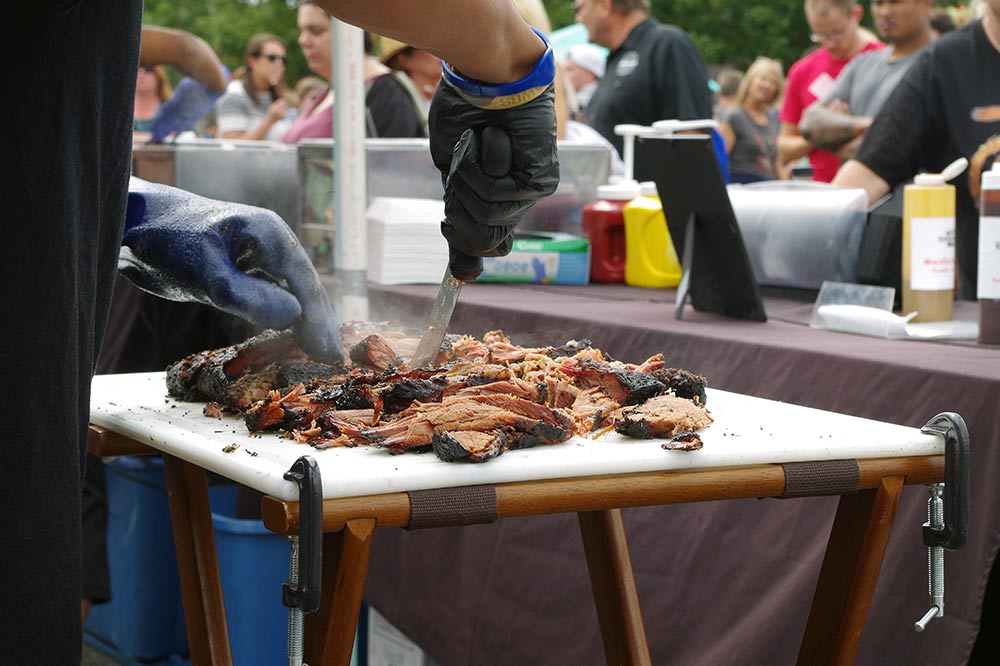Whether it’s specifically food festivals or festivals that also features food, there are a lot of reasons for restaurants to participate:
- The potential to reach new customers – it’s sort of like opening a pop up restaurant, but one that pops up smack dab in the middle of a crowd!
- Festivals also allow you to connect with customers who have already been to your restaurant. They might know your food, but working events like this put a face to your brand.
- The opportunity to try out new items along with go-to favorites. If the new items are a hit, it can be a sign they’re ready to put on your menu.
- Food festivals create networking opportunities among other local companies. Some might be restaurants, some bakeries and chocolatiers, and some might be non-food vendors.
- Bottom line, it’s a chance to make money!
However, participating in festivals might not be right for your restaurant or it might not be right for your restaurant right now. Make sure to ask yourself these questions first.
Have you served food offsite before?
With food festivals being a big undertaking, this is a big question. Have you and whoever will be assisting you at the festival ever worked an event? It’s a very different cooking and serving situation than working a restaurant shift. And unlike catering where you’re paid in advance and know how many you’ll be serving, working at a festival means your profits aren’t guaranteed up front.
Can your food be adapted to serve lots of people very quickly?
If you already offer a buffet in your restaurant, you’re already cooking the food in large batches meant to be kept warm for a decent period of time before serving. In other words, with a few tweaks, it could be adapted to a festival scene. If you offer primarily plated dishes, working a festival is still doable, but you’ll need to be careful.
Make sure the dishes you choose can be made quickly and served out to large numbers at a time. You may also consider scaling down the portion size of your dishes, to make them more appealing to festival-goers.
Which food festivals are the right choice?
The question isn’t just if you should be participating in food festivals generally, but if this particular food festival is the right one for your business. What have you heard about this event from other restaurants? Were their experiences with the event managers good? Did they turn a strong profit? Does this festival fit your brand? Will your menu stand out among the various types of stands that were there last year?
Do your homework. The event sponsor should provide details on the event for a vendor. They need to give you the details on the space and minimum supplies provided like tables and water availability, electricity sources, permits, payment (will there be tickets or cash?), meeting times, etc. If they do not seem at least organized enough to tell you those important details, perhaps just attend as a guest this year before you risk participation.

If you answered “yes” to the questions above and do decide to apply for a festival, you should keep these tips in mind:
Be prepared.
This goes beyond just the food and into possible permits and additional insurance. Festival organizers should provide their vendors with a checklist, but also look up what is needed the festival area to ensure you are following all rules to the letter. Talk to other restaurants you’re on good terms with who have done festivals before (especially if they’ve done this particular festival before) and ask for advice.
Think food safety and quality first.
Food festivals can make or break a restaurant’s reputation. The standard operating process for your concept and food should still be followed, even offsite. What do you need to keep the food quality to your standard? More importantly, what will you need to do to ensure it’s safe to consume?
Secure a delivery vehicle.
You need to get the food, supplies, and any other equipment there. If you have a specific food delivery truck for catering, that’s great! But if you don’t, make sure you have a reliable vehicle available that can easily transport the items you need in as few trips as possible.
Prep what you can in advance.
Figure out what makes more sense to prep at your kitchen and what you’ll need to do on the day of the festival at your table. Have a game plan in terms of how you’ll be plating everything – including buying the kinds of disposable containers or plates, cups, and utensils you’ll be using.
Keep the dishes “on the go.”
Either from lack of seating or simply wanting to stay on the move, most festival-goers are going to literally walk away with their food. Making the items as portable as possible is a smart idea. Keep portions manageable. Avoid soups. And even if it’s a cliché, think of how you can put food (particularly meat) on sticks. If your food seems like it’s going to be a hassle to carry around, customers might go to the next table over, even if your dish looks and smells delicious.
Train and prepare your staff.
Working an outdoor festival, especially on hot days under a sweltering tent, can be tough! Even if your staff is used to long work shifts in your regular kitchen, working on site can be a very different experience with very different set of challenges. You want to make sure your staff knows what you expect from them. They need to be prepared both in how to make the dishes on site and how to keep up their energy.
Ensure everyone knows what to wear to stay comfortable while working outside, and has easy access to water so they stay hydrated. If your staff has already been trained to handle event catering in the past, make a point to mention how the festival will be different from their normal catering tasks. It’s all about giving them the tools to succeed through that proper training and you’ll find the whole experience will go more smoothly.

Keep a focus on marketing.
Make sure your table’s banner and other signage includes your information. Depending on the food festival’s regulations, make sure your menu is prominent with large font to lure passersby with your offerings.
If you have room, considering setting up a business card stand or flyers so people can take one, or have napkins printed up to include your contact information. You just want to make sure guests don’t walk away from your table loving your food … but having no idea who you are. And don’t forget marketing to your current clientele! Promote your participation in the event to your restaurant guests before the big day. That way, they know to stop by and say hello if they’re also going.
Be ready for weather.
Have a backup plan if it rains, both in terms of covering up the food and what to do if the festival gets cancelled or has low turnout due to weather. You would have all of these ingredients left over, so know either how you’ll use them in your restaurant or where you can easily donate them to ensure they don’t go to waste.
Start small and close by.
Do not be afraid to ease into festival participation. You don’t have to jump into applying for the biggest one of the summer, or one hundreds of miles away from your business. If you haven’t done many events, chances are you won’t be ready for the challenges that come with that kind of serving experience. It’s better to test the waters through catering and smaller food festivals, get really good at them, and then ease into bigger events.
Want to explore other ways to make summer work harder for your restaurant? Download our free eBook on summer marketing tips today:






